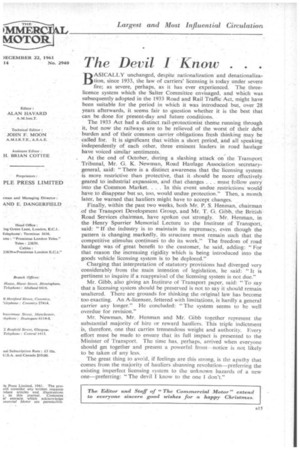The Devil I Know . . .
Page 19

If you've noticed an error in this article please click here to report it so we can fix it.
BASICALLY unchanged, despite nationalization and denationalization, since 1933, the law of carriers' licensing is today under severe fire; as severe, perhaps, as it has ever experienced. The threelicence system which the Salter Committee envisaged, and which was subsequently adopted in the 1933 Road and Rail Traffic Act, might have been suitable for the period in which it was introduced but, over 28 years afterwards, it seems fair to question whether it is the best that can be done for present-day and future conditions.
The 1933 Act had a distinct rail-protectionist theme running through it, but now the railways are to be relieved of the worst of their debt burden and of their common carrier obligations fresh thinking may be called for. It is significant that within a short period, and all speaking independently of each other, three eminent leaders in road haulage have voiced similar sentiments..
At At the end of October, during a slashing attack on the Transport Tribunal, Mr. G. K. Newman, Road Haulage Association secretarygeneral, said: "There is a distinct awareness that the licensing system is more restrictive than protective, that it should be more effectively geared to industrial expansion, and that changes . . . must follow entry into the Common Market. . . . In this event undue restrictions would have to disappear but so, too, would undue protection." Then, a month later, he warned that hauliers might have to accept changes.
Finally, within the past two weeks, both Mr. P. S. Henman, chairman of the Transport Development Group, and Mr. T. G. Gibb, the 13ritish Road Services chairman, have spoken out strongly. Mr. Henman, in the Henry Spurrier Memorial Lecture to the Institute of Transport, said: "If. the industry is to maintain its supremacy, even though the pattern is changing markedly, its structure must remain such that the competitive stimulus continue;' to do its work." The freedom of road haulage was of great benefit to the customer, he said, adding: "For that reason the increasing rigidity which is being introduced into the goods vehicle' licensing system is to be deplored."
Charging that interpretation of statutory provisions had diverged very considerably from the Main intention of legislation, he said: "It is pertinent to inquire if a reappraisal of the licensing system is not due."
Mr. Gibb, also giving an Instituie of Transport paper, said: "To say that a licensing system should be preserved is not to say it should remain unaltered. There are grounds for thinking the original law has become too exacting. An A-licensee, fettered with limitations, is hardly a general carrier any longer." He concluded: "The system seems to be well overdue for revision."
Mr. Newman, Mr. 1-fentnan and Mr. Gibb together represent the substantial majority of hire or reward hauliers. This triple indictment is, therefore, one that carries tremendous weight and authority. Every effort must be made to ensure that its full impact is presented to the Minister of Transport. The time has, perhaps, arrived when everyone should get together and present a powerful front—notice is not likely to be taken of any less. .
The great thing to avoid, if feelings are this strong, is the apathy that comes from the majority of hauliers shunning revolution—preferring the existing imperfect licensing system to the unknown hazards of a new one—preferring: "The devil I know to the one I don't."
























































































